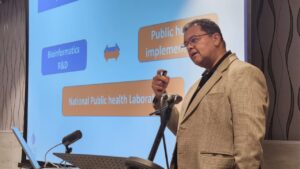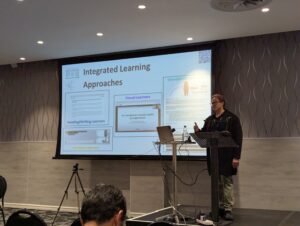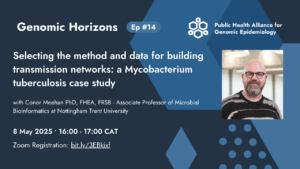
Correction:
Public Health Alliance for Genomic Epidemiology (PHA4GE) is a global consortium founded on principles of fairness, openness and transparency. In February 2021, we distributed a sub-grants call amongst the community to promote sustainable development in bioinformatics to support public health (Reference: PHA4GE/2021-01). A deliverable was described in different statements in the Scope of this call that referred to the submission of sequence and contextual data to repositories such as INSDC and GISAID. The variations in these statements sparked different interpretations where among others (i) INSDC was seen to be the repository of choice above all other repositories; (ii) GISAID and INSDC were taken to be the only repositories of choice;(iii) PHA4GE was seen to be weakening GSAID and (iv) PHA4GE has a colonial science agenda.
We apologize for any inconvenience caused on the miswording in the drafting and or misinterpretation in reading the call. The inconsistencies in the wording were revised and the updated version can be viewed here. We reiterate that we do not condone any discriminatory, racist or unfair practices in our work and value the involvement of all our community in this consortium.
PHA4GE Secretariat
(END)
(REFERENCE: PHA4GE/2021-01)
Closing date for applications: 10 March 2021
Public Health Alliance for Genomic Epidemiology (PHA4GE) (www.pha4ge.org) is a global consortium established in 2019, to ensure a rapid global genomic-driven public health response to disease outbreaks. Our community includes partners and stakeholders such as funders, public health organizations at international, regional and national levels; and non-specialist individuals across the world. The consortium has Working Groups, that are made up of representative individuals, from the growing list of over 30 partner organizations. These Working Groups drive various activities to fulfil the consortium’s mission. Our mission is to establish global consensus on data standards, document and share best practices, improve the availability of critical bioinformatic tools and resources and advocate for greater openness, interoperability, accessibility and reproducibility in public health bioinformatics.
Overview
Public Health Alliance for Genomic Epidemiology (PHA4GE) is calling for proposals for six (6) sub-grants with a total value of USD150,000 to assist work in bioinformatics within LMICs in Africa and Asia. This encompasses development of open and interoperable public health bioinformatic software, development of standardized bioinformatic tools and infrastructure, usage of bioinformatic software or tools, implementation of standards developed by PHA4GE, maintenance of bioinformatic software or infrastructure, capacity development in bioinformatics, and any other related activities to bioinformatics.
The themes to these sub-grants are as follows:
Theme 1: Implementation of standardized bioinformatics practices, pipelines, and data structures in AMR sequencing laboratories in LMICs (3X 20000 USD)
Antimicrobial resistance (AMR) is a global health problem that contributes to tens of thousands of deaths per year around the globe. The World Health Organization has declared that antimicrobial resistance is one of the top ten global public health threats facing humanity, and has identified large gaps in existing surveillance. Genomic surveillance of AMR is a powerful tool that is increasingly being used to understand the evolution of resistance, as well as perform source attribution and track the spread of AMR determinants (genes). A number of tools exist that can be used to detect the presence of AMR genes in public health microbial sequence data. These widely-used AMR detection tools differ in terms of their inputs, functionality (including parameters and reference databases), and outputs. Differences in the meaning, structure and range of values in the different outputs of these tools can make comparing and interpreting results difficult for public health laboratories. To address these issues, PHA4GE has developed a standardized AMR gene detection output specification to better harmonize AMR analysis results, resulting in improved interoperability and information exchange across tools and laboratories. The goal of this award is to put data standards into practice to better facilitate the exchange of AMR genomic surveillance data between public health laboratories. Projects should describe how teams will collaborate to use the specification and associated resources to harmonize and exchange AMR surveillance data, where data sharing did not previously exist, or was difficult.
Theme 2: Implementation of standardized bioinformatics practices, pipelines, and data structures in SARS-CoV-2 sequencing laboratories in LMICs (3X 30000 USD)
Genome sequencing of the SARS-CoV-2 virus has been a key tool for understanding the spread of the disease at global, national and local scales, developing diagnostic tests and vaccines, and refuting misinformation during the pandemic. With the emergence of viral variants of concern, sequencing and sequence analysis have become essential activities for National Public Health Institutes (NHPIs). While routinely used pipelines for SARS-CoV-2 analyses are available in the scientific community (https://github.com/CDCgov/SARS-CoV-2_Sequencing), laboratories experience challenges associated with SARS-CoV-2 analyses include difficulty in submitting raw sequences to internationally databases such as GISAID and INSDC in an interoperable and standardized manner; lack of access to reliable compute resources to execute analyses and training of public health professionals in bioinformatics skills for SARS-CoV-2 analysis. PHA4GE and its partners have identified best practices for infrastructure, analysis pipelines and metadata associated with SARS-CoV-2 sequencing. The goal of the award is for NPHI’s to work with PHA4GE to adopt these best practices identified as they build capacity for SARS-CoV2 sequence data analysis and data sharing. Applications are sought that would implement interoperable and reproducible SARS-CoV-2 analysis and sharing of data via INSDC and GISAID databases.
The scope to these sub-grants is detailed in Appendix 1: Scope for PHA4GE subgrants.
Eligibility Criteria
This call is open to the following types of sequencing laboratories:
- National public health institutes (NPHIs) in low to middle income countries in Africa and Asia
- Academic bioinformatics laboratories in Africa that partner with any NPHIs in Africa and Asia
- Public health laboratories in Africa and Asia
Only one award may be awarded to one organization.
The organization should not have any cases levelled against it by any Professional Councils and/or public courts relating to professional misconduct.
None of the desired funds will be diverted to support activities that are not related to the submitted proposal. Allowable expenses include salaries and travel costs.
None of the individuals to be involved in the work, such as staff and volunteers, have potential conflicts of interest.
Timelines
Spending of the grant may cater for deliverables that are within a time-frame of five (5) months.
Format for proposals
All proposals are to be submitted, in English, using the PHA4GE Sub-grants Proposal Form
Submission of proposals
All submissions are to be submitted to the PHA4GE Secretariat as a single .pdf file on the following email address: [email protected]. Please use the following subject line: Application for Bioinformatics sub-grant (PHA4GE/2021-01)
Regrettably, incomplete proposals and/or submissions will not be reviewed.
Only successful applicants will be informed within thirty (30) days after the closing date.
Closing date for applications: 10 March 2021
For any assistance or queries relating to finalising and submission of this application, please email us at [email protected]



